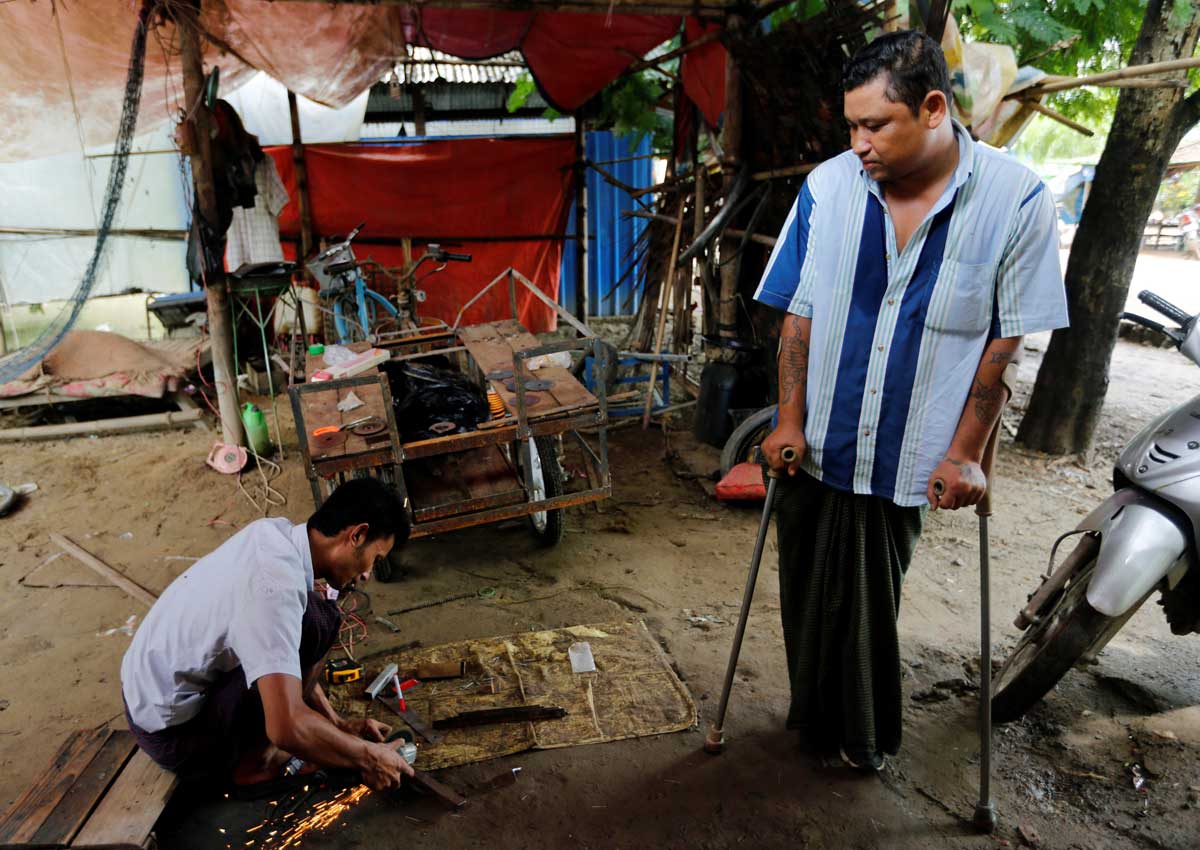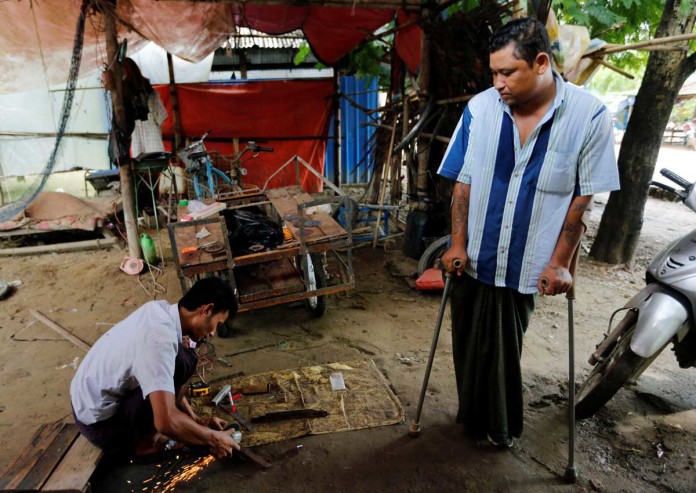YANGON – Disabled and collecting fees to use a public toilet in a busy Yangon market was not how Kyaw Kyaw Oo imagined the life of a soldier when he lied about his age to join the Myanmar army at 16.
Four years later, a landmine blast tore through his legs during fighting in the country’s east. He nearly died from an infection after an eight-day journey to hospital and lost both his legs.
Discharged in 1999, he was unemployed and living at home, relying on his aging parents for support. In 2008 he moved to Yangon, the country’s largest city, where an official “had pity”on him and helped him get a job at the market.
For some 60 years, Myanmar has been in a state of perpetual civil war, with multiple ethnic armed groups killing and maiming unknown thousands of soldiers. With military casualties a closely guarded secret, wounded veterans were kept largely out of public view. “If we didn’t have someone to depend on, like parents, things would have been very bad for us,” said Kyaw Kyaw Oo.
Now, amid rapid economic and social reforms that began in 2011, the cost of years of fighting is slowly being revealed.
Wounded former soldiers, with few job opportunities, are reliant on a veterans’ assistance scheme that offers minimal medical care or financial support.
A new government led by Aung San Suu Kyi’s National League for Democracy (NLD) knows it must work with former foes from the military high command, who remain powerful under a constitution written by the armed forces.
But rank-and-file veterans of Myanmar’s long-running conflicts fear being left on the margins of the transformation taking place around them.
ARMY RULE
Myanmar’s military ran the country from a coup in 1962 until it relinquished direct control in 2011.
Many top junta members amassed great wealth, visible now in high-end enclaves of Yangon, where mansions rise behind barbed-wire topped walls, and the sprawling compounds in the capital Naypyitaw.
Aung Gyi, 56, who also lost both of his legs to a landmine in 1979 battling communists, lives a drastically different life.
Like Kyaw Kyaw Oo and around 50 other wounded soldiers, he was given his home a 45-minute drive outside Yangon in 2012.
The neighbourhood, bureaucratically titled, “Ward-6, Agriculture and Livestock-1”, has provided the wounded veterans who live there with a sense of community, residents said.
On a recent day, a barber with an aging artificial leg visible beneath his longyi – a traditional sarong worn by men – sat outside his shop chatting with friends. Another man limped behind a toddler running down the road.
But the single room homes lack indoor toilets and have no special features to accommodate the residents’ disabilities.
Aung Gyi, who shares his with five family members, receives 40,000 kyat (S$45) per month from the military.
He recognises, nonetheless, that he is more fortunate than most. “There are many wounded veterans who still don’t have a place to live,” he said.
FUNDING SCARCE
The NLD, which faces sky-high expectations that it can rapidly transform a country impoverished by decades of junta rule, is unlikely to find much extra cash for veterans. “We don’t have any special plan giving any assistance to the disabled veterans, we only help former political prisoners,” Han Tha Myint, an NLD central executive committee member, told Reuters. “We can’t afford to do much.” An official from the Myanmar War Veterans Organisation in Naypyitaw, which oversees veterans’ affairs, said there were currently 250,000 veterans registered with the group.
Around 10,000 were wounded in combat, said the official, who asked not to be named because he was not authorised to speak to the media, adding that funding remained a “major problem”.
The MWVO had tried to stop some homeless veterans begging or selling used book on the streets in Yangon, the official said. “We invite them to join our organisation so that we can help with whatever assistance we can afford,” said the official.
Kyaw Kyaw Oo lost his job at the market in 2013, when the officer who helped to get him hired left. He began selling lottery tickets from his homemade wheelchair, but struggles to travel between downtown Yangon and his home outside the city. “I think we deserve more assistance from the state,” said Kyaw Kyaw Oo, who had followed his father and two uncles into the army. “I believe my family and I sacrificed a lot for the country.”






